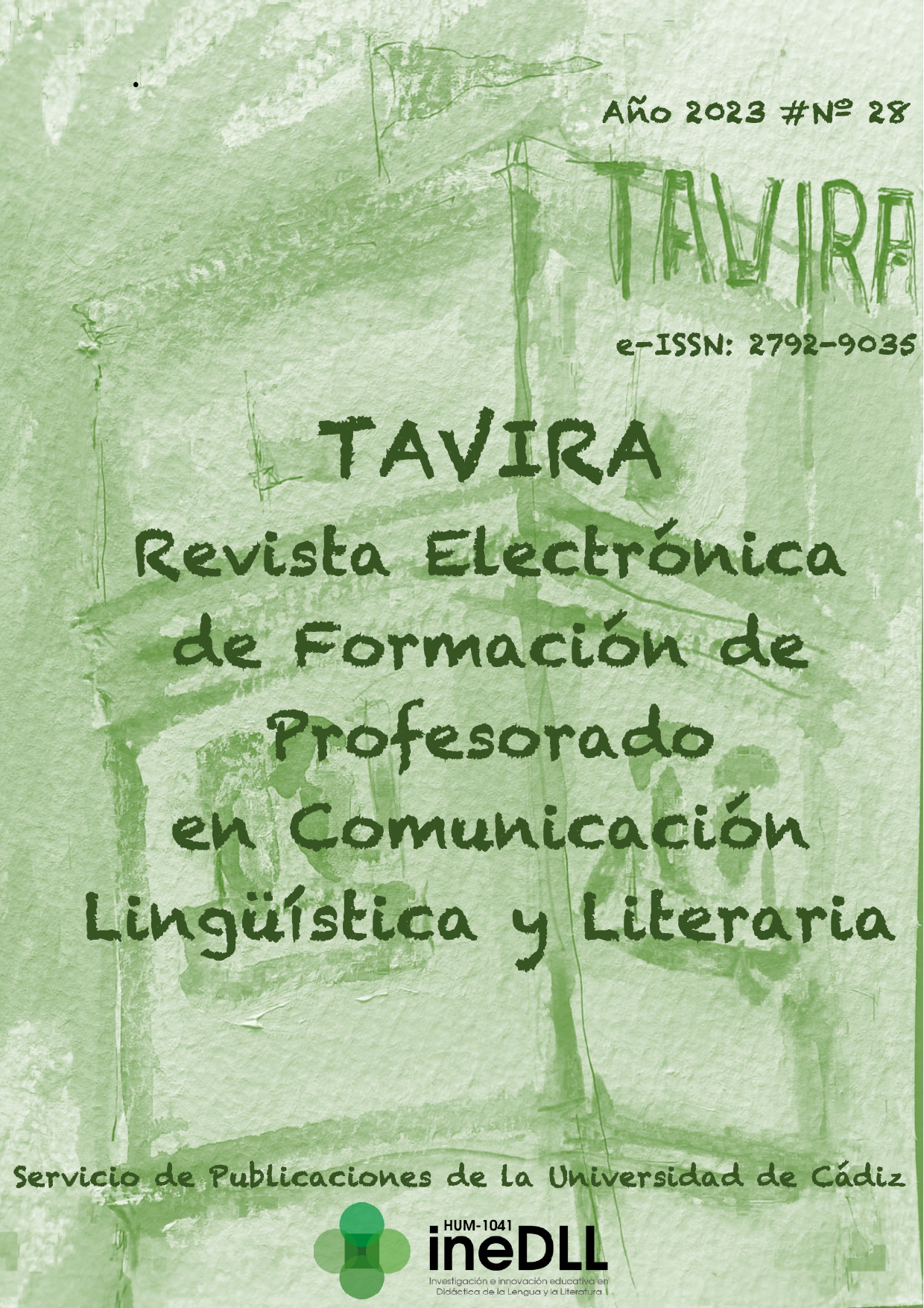The Egramint project from the teaching perspective: an opportunity to reflect on teaching practice

Downloads
- PDF (Español (España)) 371
- EPUB (Español (España)) 72
- VISOR (Español (España))
- MÓVIL (Español (España))
- XML (Español (España)) 13
DOI
https://doi.org/10.25267/Tavira.2023.i28.1101Info
Abstract
The objective of this article is to show how a group of secondary school teachers approached, through the classroom implementation of teaching sequences from the project “The Elaboration of an Interlinguistic School Grammar: Towards Reflexive Language Teaching in Multilingual Contexts” (Egramint), the concerns and questions raised by the teaching of grammar in secondary classrooms. This experience also became a training process, since, after a theoretical-practical session taught by members of Egramint, the teachers analyzed their practices through different instruments (pre- and post-implementation questionnaires, discussion groups, interviews about the adaptations of the SDGE and analysis of its interventions in the classroom). Subsequently, they presented their reflections at one of the symposiums of the IX International Congress on Grammar Teaching (Congram 2023). The works we present reveal that participation in the Egramint project contributed to the development of the ability to analyze their own practice, ask new questions and transform their actionKeywords
Downloads
Supporting Agencies
How to Cite
License
Copyright (c) 2023 Victoria Abad Beltrán, Miguel Campos Royo, V´íctor Ferrer Claramonte, Noelia Ponce Martínez, María Reverte Gracia

This work is licensed under a Creative Commons Attribution-NonCommercial-NoDerivatives 4.0 International License.
Authors who have publications with this journal agree to the following terms:
- They will retain their copyright and grant the journal the right of first publication of their work, which will simultaneously be subject to the Creative Commons Attribution License. They may copy, use, disseminate, transmit, and publicly display, provided that authorship, url, and journal are cited, and they are not used for commercial purposes. Derivative works are not permitted.
You may adopt other non-exclusive licensing arrangements for distribution of the published version of the work (e.g. deposit it in an institutional telematic archive or publish it in a monographic volume) as long as the initial publication in this journal is indicated.
Disseminate your work on the Internet (e.g. in institutional telematic archives or on your website), which can lead to interesting exchanges and increase citations of the published work. (See The Open Access Effect)
References
Camps, A. y Zayas, F. (Coords.). (2006). Secuencias didácticas para aprender gramática. Graó.
Durán, C., Jover G., Linares, R., Manresa, M. y Muñoz, A. (2022). Del currículum al aula: planificación didáctica en lengua y literatura. Textos. Didáctica de la lengua y la Literatura, 97, 7-19. https://n9.cl/3pnqf
Esteve, O. (2011). Desarrollando la mirada investigadora en el aula. La práctica reflexiva: herramienta para el desarrollo profesional como docente. En U. Ruiz
Bikandi. (Coord.). Lengua castellana y literatura. Investigación, innovación y buenas prácticas (pp.29-43). Graó.
Gardner, R. (1985). Social psychology and second language learning. The role of attitudes and motivation. Sage Publications, Ltd.
Imbernón, F. (2016). Nuevos escenarios, nuevos aprendizajes y, por supuesto, nueva formación del profesorado. Dosier Graó, 1, 56-59. https://bit.ly/3ZpO7Xr
Imbernón, F. (2019). La formación del profesorado de educación secundaria. Profesorado. Revista de currículum y formación del profesorado, 23, 3. http://doi.org/10.30827/profesorado.v23i3.9302
Imbernón, F. (2020a). Desarrollo personal, profesional e institucional y formación del profesorado. Algunas tendencias para el siglo XXI. Qurriculum, 33, 49-67. http://doi.org/10.25145/j.qurricul.2020.33.04
Imbernón, F. (2020b). La formación permanente del profesorado: algunas inquietudes, evidencias y retos a superar. Crónica: revista científico profesional de la pedagogía y psicopedagogía, 5, 03-112. https://bit.ly/3LuSScm
Latorre, A. (2004). La investigación-acción. Conocer y cambiar la práctica educativa. Graó.
Llompart-Esbert, J. (2021). Lenguas, migraciones y escuela. Textos de Didáctica de la Lengua y la Literatura, 94, 30-35. https://bit.ly/46dYrUI
Martin, G. R. R. (1996). Juego de Tronos. Plaza & Janés.
Nunan, D. (2004). Task-based language teaching. Ernst Klett Sprachen.
Rodríguez-Gonzalo, C. (2021). Una gramática escolar interlingüística. Hacia una enseñanza reflexiva de las lenguas en contextos multilingües. Huarte de San Juan.
Filología y Didáctica de la Lengua, (21), 33-55. https://doi.org/10.48035/rhsj-fd.21.2
Rodríguez-Gonzalo, C. (2022a). La enseñanza reflexiva de las lenguas en contextos multilingües (EGRAMINT). Tavira: Revista electrónica de formación de profesorado en comunicación lingüística y literaria, 27, 1-14. https://doi.org/10.25267/Tavira.2022.i27.1104
Rodríguez-Gonzalo, C. (2022b). Situaciones de aprendizaje para la reflexión interlingüística. Textos de didáctica de la lengua y la literatura, 97, 41-46. https://bit.ly/48fKuHP
Ruiz Bikandi, U. (2006). La salida del topo: caminos de transformación práctica en un proceso formativo. Análisis de una entrevista. En A. Camps (Coord.), Diálogo e investigación en las aulas. Investigaciones en didáctica de la lengua (pp.221-241). Graó.
Varela, L., Gradaílle, R., y Teijeiro, Y. (2016). Ocio y usos del tiempo libre en adolescentes de 12 a 16 años en España. Educação e Pesquisa, 42(4), 987-999. https://doi.org/10.1590/S1517-9702201612152404






